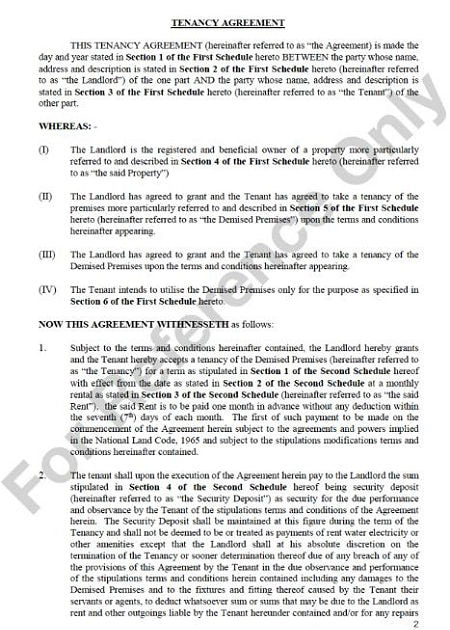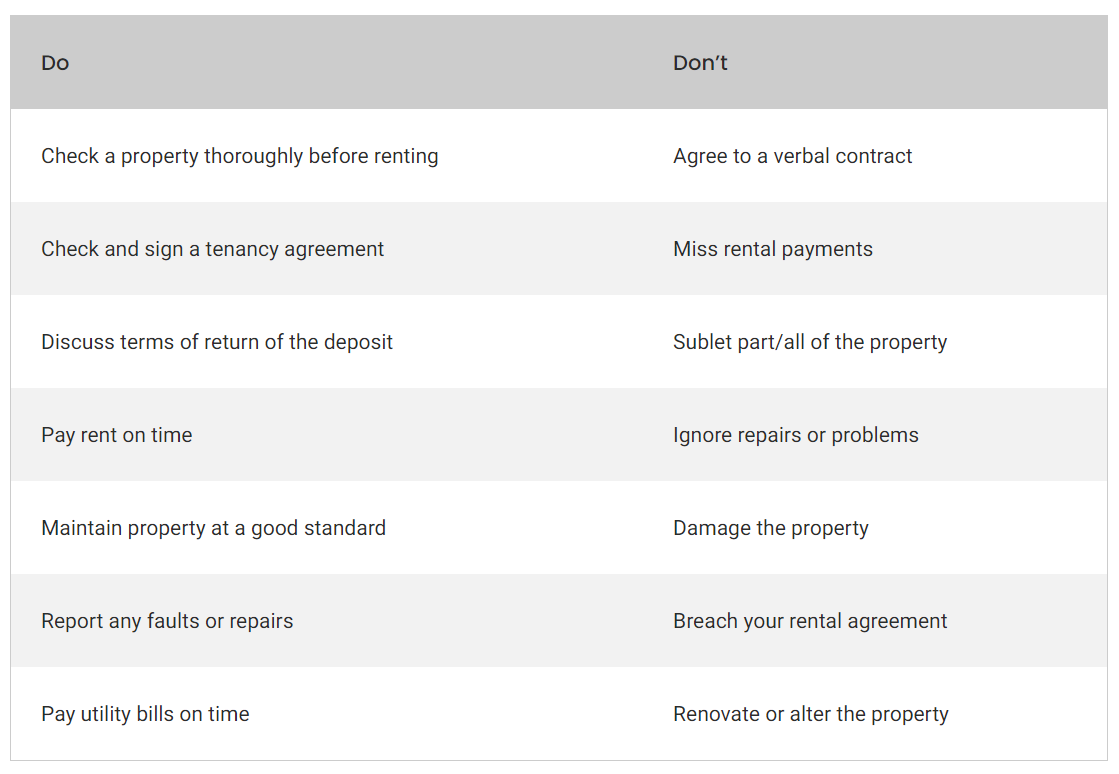|
The question of where to live has different answers for everyone. Some people want to buy an affordable home on the outskirts of town, while others are on the hunt for an awesome condo to rent in downtown KL. In meeting those needs, more and more Malaysians are deciding to rent property rather than buy, whether for economic or individual reasons. Affordable homes have been a big part of the conversation in Malaysia over the last decade. As house prices have risen, so too has the pressure on the nation’s rental market. The question of rental practice, and tenancy agreements in Malaysia, can sometimes seem a little confusing though. So in order to clear up the complications of rental practice, we’ve created a comprehensive guide to tenant rights and the role of a rental agreement in Malaysia. What Are Your Rights As A Tenant Tenant rights in Malaysia are something of a complicated picture. While there’s currently no specific legislation covering rental agreements, a study is underway to introduce a much-anticipated Residential Tenancy Act in the next few years. This act is not only designed to protect tenants but to ensure a fair market for landlords too. As things currently stand, there’s no single regulatory framework or mandatory contractual obligation for a specific tenancy agreement. You can meet Ali on the street and agree to move into his apartment, creating an oral agreement for tenancy. Of course, you’d be mad not to check the house first! So what laws impact the rights and responsibilities of tenants and landlords? Here’s a quick list:
One crucial piece of legislation to note is the definition of a tenancy itself. Under the National Land Code, any rental under three years is defined as a ‘tenancy’, and does not require registration. Any lease for a period longer than three years is technically defined as a ‘lease’, and would require registration. So with all these complications, how best to protect yourself? Well, a tenancy agreement is a good place to start. Here are more details of the tenancy agreement, and a tenancy agreement sample below: This kind of rental contract lays out the terms and conditions agreed upon by the landlord and tenant at the start of a rental period. It’s an important document to ensure that both parties understand their responsibilities, and both parties have their rights protected. While the sample rental agreement above offers a general template, the nuts and bolts of an agreement are down to you and the landlord. That can include standard clauses such as rental cost and rental period, but also cover oddly specific things such as whether your goldfish is allowed to stay, or even if you’re allowed to decorate your bedroom. It’s common for landlords or letting agencies to offer an existing tenancy agreement template, but don’t be afraid to ask for additional clauses if you really want to make sure things you’ve discussed are set down in stone. Make sure you check the property thoroughly before signing the agreement too – often you’re accepting the property as it currently is, meaning if you miss out on a broken air-cond now, you might be charged for it later. Now, here are some of the things you should look for in a rental agreement:
Early Termination Of Tenancy Agreement In Malaysia This is a question that gets asked a lot, so it’s worth highlighting clearly. Under current contract law in Malaysia, if you sign a two-year rental agreement, and then choose to cancel after one year, you may be liable for the 12 months of outstanding rent Since the original tenancy agreement covered a two-year period, then contractually you are obliged to fulfil that obligation! Sucks? Sure does. There’s also a situation where a change of ownership may cause issues. If a rental agreement is registered as a lease, then in the event a property is sold, the new owner is automatically tied to that agreement. If the property is rented for less than three years, and the owner claims no knowledge of the rental agreement, the buyer may have the right to remove the tenant. Such problems can be smoothed over if the original owner sets out terms as part of the Sale and Purchase Agreement to allow the tenancy to run its course. What Your Landlord Should Expect Of You Don’t forget – landlords have their own rights too! Many of those rights will be set out in the rental agreement itself, but a common understanding of a tenant’s duty of care and respect for property can be summarised fairly simply with the following expectations:
Your Obligations As A Tenant We sometimes think of our obligations (while we’re tenants) as simply financial one. It’s true though, that the landlord is going to come looking for you if you don’t pay your monthly rent! You also have obligations to ensure you maintain that property at a good standard and care for it during your tenancy. Those responsibilities can include:
Rental Fee And CostsThere’s that little matter of deposits or booking fees to consider when signing up for a rental property. The rent might be RM1,000 a month, but chances are you will need a more substantial deposit upfront. This is typically in the form of a security deposit, committing an amount that goes towards any repairs in the event you cause damage to the property. This is often set at the equivalent cost of 2 months rental. So if your rent is RM1,000, the deposit would be RM2,000. The earnest deposit is another element of the rental market worth noting. This is often priced at an amount equivalent to the first month’s rent and is considered a holding fee to note your intent for a property and ensure the landlord doesn’t rent it out elsewhere. This should be paid to a reputable agent, who acts as a responsible (and NEUTRAL) third-party holding this fee. Make very certain you understand the terms and conditions around the earnest deposit, what it counts towards, and what happens once the full agreement is complete. A utility deposit may also be taken, which would provide payment security against any unpaid utility bills at the time the rental agreement ends. Stamping fees and administrative charges may also be required, and relate to legal review and stamping of the rental contract agreement. This means a lawyer has reviewed and certified the tenancy agreement. It’s worth discussing where this obligation for these fees will sit, since in some cases a landlord would shift those to a tenant rather than pay themselves. Often the legal fees are paid by the landlord, and the stamping duty by the tenant. 2023 Rental Legal Fees What Happens In A Tenancy Dispute Good communication is the first step to preventing any disputes! Be honest and open with your landlord or landlord’s letting agent. That means if accidents happen or things break down, you should tell them. Likewise, it’s important your landlord keeps you informed of any problems. If they’re sending around a repairman to upgrade or fix something in the house, they should tell you in advance, and not just assume you’re happy that some random plumber turns up without warning. These are basic examples, but paint a picture of the importance of good communication. Discussion should always be the first step in any dispute. It may be that a verbal agreement can fix a problem far better than any legal action. Many such disputes will already be covered by the terms and conditions of a good tenancy agreement. Common Legal Problems For Renters The most common legal problem for renters is the question of early termination of the contract outlined above. Let’s stress again – if you terminate a rental contract agreement early, you may be liable for the full rental payments due for the remaining term of the contract. Early termination by the landlord is another common problem. Your tenancy agreement should cover this situation also. It is unlawful for a landlord to evict a tenant randomly, without a court order, as covered in the Specific Relief Act 1950. This legal cover also includes your landlord making the property inaccessible by changing the locks. If, however, you fail to pay your rent on time or damage the property, there is likely to be a clause of termination as a result. The landlord can serve you with a payment notice, and then seek eviction if you fail to pay. This process is a lengthy and often costly one for the landlord. Tenant Do’s and Don’ts With all the considerations you need to make as a tenant, let’s explore a quick reference list of Do’s and Don’ts to help you through Disclaimer: The information is provided for general information only. mpighome.com makes no representations or warranties in relation to the information, including but not limited to any representation or warranty as to the fitness for any particular purpose of the information to the fullest extent permitted by law. While every effort has been made to ensure that the information provided in this article is accurate, reliable, and complete as of the time of writing, the information provided in this article should not be relied upon to make any financial, investment, real estate or legal decisions. Additionally, the information should not substitute advice from a trained professional who can take into account your personal facts and circumstances, and we accept no liability if you use the information to form decisions.
The article above is refer from propertyguru.com.my
0 Comments
Leave a Reply. |
AuthorFrom Various Author articles. Jonathan de Ho & reference from others Author articles Archives
November 2023
Categories |
- Home
-
New Property Launch
- Lakeside Freehold Fully Residential Private Lifestyle Condominium in Cyberjaya
- Spacious 2024 Completion KL Condo Fully Residential KLCC View
- RUMAWIP Bukit Jalil (Bumi Only)
- Lake City @ KL North NEW PHASE FROM RM380k
- Alora Residences – Inspired living within greenery in Subang Jaya
- PJ Spacious and Affordable 5 Star Condo
- Best Investment 2022 PJ Damansara Low Risk Low Entry Price High ROI
- 2022 PJ Rumah Mampu Milik RM270k Damansara
- Bangsar South 2 Rooms from RM390k BELOW Market Price
- 10% ROI PJ Project near Ikea and One Utama Mall
- Mid Valley Seputeh New Launch
- Pavilion Damansara Heights 柏威年 白沙罗岭 马来西亚 吉隆坡 精选楼盘
- 马来西亚RM300千的PJ屋子-首购族,年轻人月入3千能买房
- 2021 Penang Most Awaited Project
- 2021 New Launch - KL Metropolis
- Freehold LRT Linked 3 Room Suites in Glenmarie
- New SPACIOUS Kepong Landed 6 Room 6 Bath
- Bangsar Last Piece Land New Launch
- Avara Seputeh (Mid Valley)
- Project Announcement Registration. Malaysia New Property Launch
-
Existing & Past Project
- 2020 Lowest Risk & Price in Klang Valley with Great ROI
- Kiara East Suite Dex
- 2019 SAFEST PROFITABLE HIGH CASHBACK INVESTMENT
- Best Property Investment Projects in 2018
- KL City Freehold Spacious Affordable 3 room Project
- Jalan Kuching Freehold New Office & Shoplot
- Jalan Ipoh New Freehold Shoplot & Offices
- RM300k KL Sentral New Prelaunch
- The Olive Condo, Sunsuria City
- Prelaunch Landed House Bukit Rahman Putra
- RM260k No Downpayment Puchong South Suites
- PJ North RM400k High Cash Back Project
- Denai Sutera @ Alam Sutera, Bukit Jalil
- First Phase of Banting New Township
- Neu Suites 3rdNVenue @ Embassy Row by Titijaya & CREC
- COURT 28, Jalan Ipoh KL City New Property Launch Service Apartment. Malaysia New Property Launch
- Semanja Kajang New FREEHOLD Kajang Double Storey Houses. Malaysia New Property Launch
- M Suite @ Desa Park North
- BIJI LIVING @ Sek 17 PJ City by Conlay. Malaysia New Property Launch
- Amani Residence Bandar Puteri Puchong New Freehold Service Apartment. Malaysia New Property Launch
- SFERA RESIDENCY @ Puchong South. Malaysia New Property Launch
- KL North Last Release
- PreLaunch Freehold Double Storey
- LAND
- News & Articles
- Other Reference Link & Services
- Referral
- Career
- MPIG
- Get Professional Advice
- PJ八打灵全新地产项目分析手册
Hours
M-S: 9.30am - 9pm
|
Telephone
+60 12 3760864
|
Email
|







 RSS Feed
RSS Feed